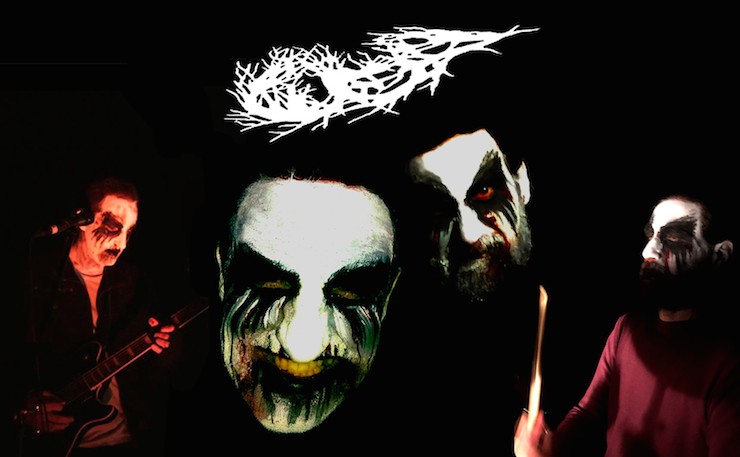The bigots now have a good reason to be afraid, writes Max Chalmers.
When Liberal Senator Cory Bernardi finally secured his inquiry into food certification earlier this year – a thinly veiled attempt to target Muslims and the halal process – the response was as expected.
In the 1323 submissions received by the inquiry the contradictions and plain absurdities of Australia’s rising tide of Islamophobia were painstakingly documented.
While government departments and a peak food body insisted the practice of certifying food as halal was helping create jobs and open lucrative markets, the inquiry was flooded with hundreds upon hundreds of submissions insisting it must be funding terrorism, ‘taxing’ shoppers, and enabling Muslims to stealthily overwhelm Australian law, politics, and culture.
Never mind the ongoing reassurances from law enforcement groups that no connection between halal certifiers and the funding of terrorism in Australia has ever been discovered, or the gentle prods from major food companies pointing out it doesn’t impact the cost of goods.
The steady flow of counterpoints, of careful corrections, never dampens the hysteria.
So what are Muslims living in Australia supposed to do when responding and coming to terms with such prejudice?
For Safdar Ahmed – a 40-year-old academic and artist with a PhD in reform and modernity in Islam – the answer is extremism. Extreme metal, that is.
Tall, intellectual, gently balding, he might seem a surprising front man for Hazeen, the black/death metal group he founded with Turkish-born Can Yalcinkaya.
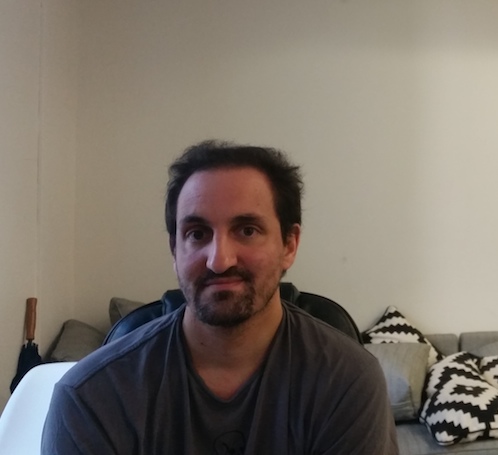
But the project has been a dream come true for the pair, a conscious effort to confound expectations, and an extension of Ahmed’s other scholarly and artistic pursuits.
If you follow Australia’s refugee debate you may recognise Ahmed as one of the co-founders of the Refugee Art Project (he has been regularly visiting people detained at Villawood since 2010). A talented artist in his own right, Ahmed has produced scores of comics and zines. Some depict the realities of life in immigration detention. Others present the personal impact of Islamophobia and general strains of modern life.
Just last night Ahmed was announced as a finalist in the ‘All Media Artwork’ of this year’s Walkley awards, for this strip.
Ahmed became interested in Islam and his own faith after a family trip to India, where one side of his family still live as part of the country’s Muslim minority.
Since then he’s undertaken a pilgrimage to Mecca, and published a number of academic works.
For years he also wanted to start a band like Hazeen, but it wasn’t until meeting Yalcinkaya, who played extreme metal as a teen in Turkey, that he found a partner able to dig the music and the message.
“Many people think extreme metal music is for disaffected middle class white kids, conservative white kids,” Ahmed says when he visits the New Matilda office. “And so we’re quite happy to be breaking that mould.”
“I think for as long as I’ve been interested in art and literature I’ve always been drawn to death metal and horror films and that world of the imagination which those things create… And just the creepiness and scariness of death metal.”
In songs like Border Hate the band is directly political, locking-on to Australia’s punitive refugee policies:
Hatred spree, racial fear, creeping pogrom, follows me.
Darkness stalks, the nation’s heart. Sovereign murders, tear us apart.
Hell now burns, in the Minister’s eye. ‘Stop the boats’, a lethal lie.
Sacred border – sacrifice. Chain your conscience, let it die.
But Hazeen’s most intriguing element is its reappropriation of extreme metal tropes, turning the genre’s dark themes and imagery to satirise western Islamophobia.
Performing in black costumes, covered in ghoulish make-up, Ahmed and Yalcinkaya become the images of horror classically associated with the genre, but also constantly present in western representations of Islam and Muslims.
They become the death cult, and pose a question to the audience: how would things look if Muslims were actually as scary as they’re made out to be?
At their inaugural gig, played in an abandoned theme-park in Sydney’s west, Ahmed towered over the crowd.
“I had my ‘Muslim zombie’ posters behind us and we pulled out all of the figures from the horror ride and they were all around us, so we had these tortured people and mummies,” he says. “It was a dream come true really, it was our high school dreams all come true.”
With the rhetoric of the ‘War on Terror’ showing no signs of fading in 2015, Ahmed argues incidents of violence involving Muslims – whether serious military clashes in the middle east, or a lone teenager wielding a knife – have become stripped of context. Instead of nuanced discussion about the causes they’re assumed to be inevitable expression of a ‘Muslim rage’ that spreads without reason, like a virus.
That de-contextualisation is at the core of movements like Reclaim Australia. In their chants and rally-cries Muslims become uniform and unthinking, slavishly beholden victims of a violent mindset. No longer fully human.
By performing as a zombie, Ahmed is taking this way of thinking to its natural conclusion.
“It’s a way of taking the whole discourse… of radicalisation and the fear of terrorism and so on, and exaggerating it to the point where you reveal its implicit absurdity,” Ahmed says. “So you’re just taking it one step further to the point where everyone can see it’s not based on legitimate fears, because it’s not.”
In a zine also published online Ahmed traces the roots of western depictions of Muslims as zombie-esque back hundreds of years.
“We get up in corpse paint, which is the way black metal musicians often paint themselves up, in black and white and a bit of blood. That’s a part of our performance and a way of evoking the monster, the zombie, and using it as a vehicle for social criticism. I’m really interested in how monsters and zombies – the horror genre, which death metal certainly draws heavily upon – can be used as a mirror to society.”
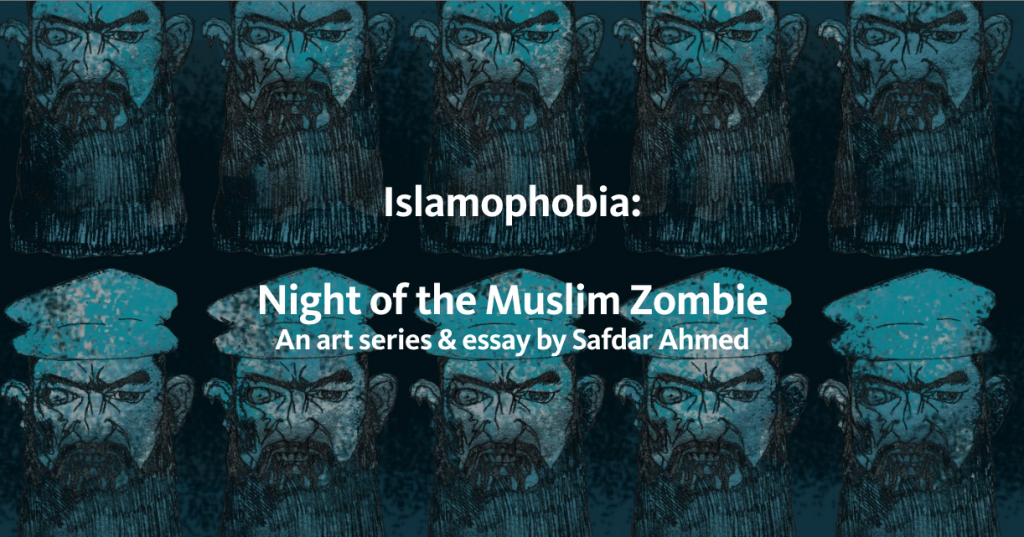
It’s incredible just how well that performance works, or at least how effective Hazeen have been at making it work. Consider some of the lyrics to another song, Beneath The Black Crescent Moon, which blends Islamic symbolism into the nightmare world of black metal.
Beneath the crescent moon, by the sound of the muezzin’s call. If you can’t find your way don’t worry, Because we’re searching, we’re looking for you!
Jihadi fighters breed, a hateful swamp of the blackest seed. White fascist raise up your brow, and receive!
Tightening the noose, on Western culture, strengthening our art for the coming death. Blackening the crypts of the shining city, a secular exhale is your fetid breath
“A Bolt through the head makes Andrew dead,” it later says.
Though Hazeen clearly engages with its social and political context, Ahmed notes it is not simply a reaction to the climate of Islamophobia. Muslims need space to create their own culture, he says, and the band draws significant inspiration from Taqwacore, a Muslim punk-rock movement initiated in the early 2000s.
“I feel as though Muslims are always put in a defensive position, they’re always being asked to perform their loyalty as Australian citizens, to show that they’re not terrorists, to argue that Islam is a calm and pristine and peaceful religion,” he says. “And that needs to be done, and many people do it, but on the other hand that almost legitimises the accusation to begin with, it’s part of that discourse.”
***
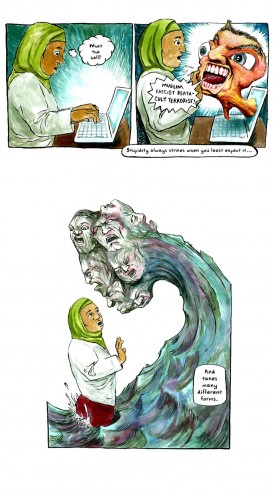
Discourse it may be, but for Muslims living in Australia the way they are being spoken about, politicised, and presented in the media is far from an abstract problem.
For some, it means an empty seat next to them on the bus. For other it’s more serious.
The prejudice that feeds off this environment has shown up in Ahmed’s life too.
After the Sydney Siege he noticed a friend from the Blue Mountains, who he knew from a young age, sharing anti-halal memes on Facebook.
“I knew that we were the only Muslims that he knew growing up – probably the only ones he still knows – and because we had that relationship as kids I felt at least obliged to try and clear up some of those misconceptions,” he says.
It didn’t go well. When challenged, the friend wouldn’t back down.
“That was very upsetting.”
Hazeen might not change the world into one where such an interaction is unnecessary, but it does provide a way for the band members to respond on their own terms. They’re currently preparing their first EP.
“I think it’s more important to respond creatively to Islamophobia and racism – or as important – as it is to respond with logic and reason,” says Ahmed. “At the end of the day racism isn’t logical and it isn’t reasonable, so some of those defences don’t even work.”
Looking at the creativity and intellectual energy that has gone into the band, you can’t help but feel Hazeen may finally give the bigots something to really be afraid of.
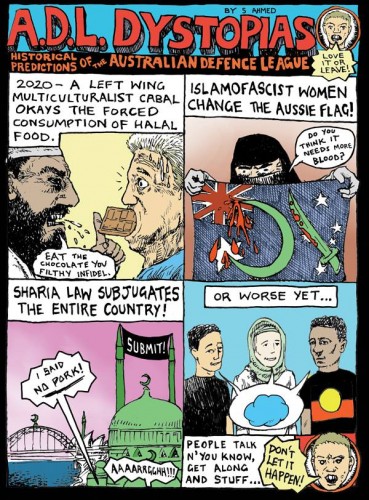
Video of Hazeen courtesy the band/Facebook.
Donate To New Matilda
New Matilda is a small, independent media outlet. We survive through reader contributions, and never losing a lawsuit. If you got something from this article, giving something back helps us to continue speaking truth to power. Every little bit counts.

